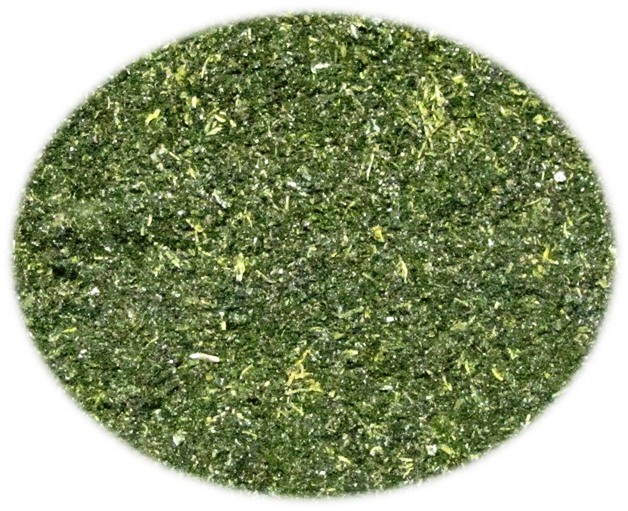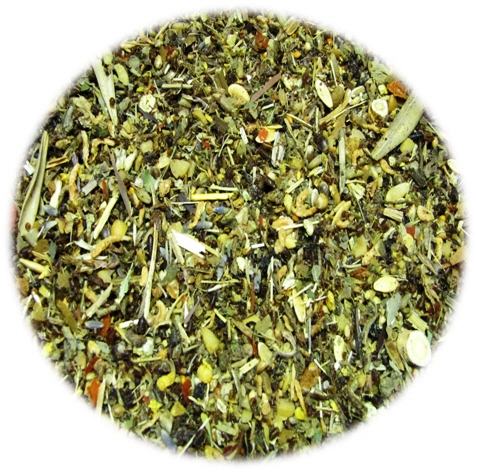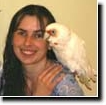About Our Hand-Mixed Supplements
Kristen Reeves, Meadowlark Farms Avian Supply, Inc.
Folks often wonder why I created our hand-mixed supplements, and how I came to the decision to use the ingredients I’ve chosen. To offer a brief explanation, it began with a life of birds and no internet access. I had no idea there were so many websites, clubs, or online stores out there. I knew that birds couldn’t survive on just seed because I watched them eating “other” things in the wild and read voraciously every book I could get my hands on about their habit in the wild. In an effort to perfect their nutrition, I spent years researching every bio-available nutrient to fulfill their needs. My mixes are the result of that research.
MLFAS Breed, Beak & Feather Tweak (BBFT):
 Gouldians from the blue line (blue, pastel, silver) are mutations. If found in the wild they would not survive long – they’d be eaten by predators or, more than likely, die from disease. Any time you remove the ability to express any part of their “color” or any other trait, you also remove or severely limit their ability to process certain vitamins and minerals – in the case of blues, that is pro vitamin A. This leaves the birds susceptible to a multitude of issues. Sinus and respiratory infections are just one of the many issues they are prone to. But feather production, thyroid issues (which affect not only other bodily functions, but specifically the breeding functions), blindness, feather quality – are all affected by the presence or lack thereof of vitamin A.
Gouldians from the blue line (blue, pastel, silver) are mutations. If found in the wild they would not survive long – they’d be eaten by predators or, more than likely, die from disease. Any time you remove the ability to express any part of their “color” or any other trait, you also remove or severely limit their ability to process certain vitamins and minerals – in the case of blues, that is pro vitamin A. This leaves the birds susceptible to a multitude of issues. Sinus and respiratory infections are just one of the many issues they are prone to. But feather production, thyroid issues (which affect not only other bodily functions, but specifically the breeding functions), blindness, feather quality – are all affected by the presence or lack thereof of vitamin A.
BBFT contains a specific proprietary combination of ingredients in the correct percentages to aid blues in processing the required nutrients. It took MANY years of testing to discover maximum effectiveness.
Ingredients are as follows:
Spirulina offers protein and vitamin B, iron and other mineral content. It aids in stress reduction (stress is a killer for blues). It boosts the immune system, increases energy, boosts the metabolism, and aids to heal wounds and reduce swelling (gout and other joint related issues). It helps to deter viral infections. Additionally, it contains small amounts of iodine which is required by the thyroid. The thyroid drives many bodily functions including breeding, molting, and a healthy endocrine system. The thyroid combines iodine with amino acids (protein) to control the conversion of oxygen and calories to energy.
Wheatgrass is also high in vitamins and minerals, specifically vitamin A, and is the key ingredient in the BBFT. The chlorophyll in wheatgrass increases oxygen levels in the body which helps prevent lowered immune system issues. But it is the combination of spirulina AND wheatgrass that works to support blue Gouldian immune systems and staves off a good amount of illness (specifically sinus infections).
Cuttlebone is actually aragonite which is a naturally occurring form of calcium carbonate – the most easily absorbable form of calcium. Calcium is needed by the body for healthy bones, muscles, nervous system, and heart – the cuttlebone in the BBFT is an added bonus – it combines with the other vitamin and minerals to support a healthy immune system. It also contains trace amounts of iodine.
I have found the BBFT to be exceptionally helpful in reducing stress related lowered immune system illnesses, specifically.
It is offered year round to blues and immunologically challenged birds (some mutations – those carrying the blue gene and a handful of white breasted birds from specific lines in my aviary – on a case by case basis). It can be added to a chitted seed mixture or sprinkled over the food at the same rate as you would salt your own food. It intensifies color and aids in breeding and the molt.
It MAY be offered to the entire aviary on a daily basis either sprinkled over food or mixed into a soft food or chitted seed mixture - except during Austerity. It is recommended that it be SPRINKLED OVER FOOD ONLY during the Resting period. I do not offer soft foods during the Resting season except in rare instances of illness or special circumstance.
PR O-MIX (PM):
O-MIX (PM):
Well before I knew there were hundreds of websites on the Internet that discussed the needs of Lady Gouldians, I had watched my birds “searching” for something. They would hang on the cage bars as if they were begging me to give them what they needed. I knew I had to figure out what was missing from their diets.
Because I kept a wide variety of finches, canaries, and waxbills, I needed something I could feed to all of them. I wanted to add a high protein breeding supplement to their diet that would aid them in building muscle but also give their chicks optimal protein. After extensive research, trial and error, I created what I consider to be one of the very reasons my birds have such outstanding feather and consistently produce robust offspring.
This mix is a proprietary combination of herbs, insects, high protein ocean products and dried egg food.
Ingredients are as follows:
High quality dried insects (dried & ground insectary raised), ground rape seed, Niger seed, canary seed, German millet, proso millet, red millet, ground flax seed, red millet, oat groats, rye grass seed, sweet pepper seed, poppy seed, dried whole shrimp, shrimp powder, hemp seed, shredded cranberry, spirulina, wheatgrass, shaved cuttlebone, dry egg meal, dried herbs, brewer's yeast, garlic.
Offered year-round to captive-bred insectivores, it makes a great substitute for live food. My insectivorous birds have raised as many chicks on this mix as they would with live insects. It may be offered free-choice to insectivores ONLY.
For Gouldians, Canaries and other non-insectivorous species, it is added to the seed at a rate of 6oz per 10lbs of food. PM contains a protein rate of about 54% and should NOT be offered year round to birds who are not mainly insectivores. Insectivores are built to handle high protein levels, however, if fed to birds who are NOT primarily insectivorous, using PM when the birds are not breeding or molting can be dangerous, causing liver and kidney issues.
***Some have asked if I worry about it settling once mixed into the seed.
I have never had a problem with it settling once added to the seed.
I have also been asked about adding smaller amounts daily instead of mixing into an entire 10lb batch of seed.
PM was created to be added to the seed at a rate of 6oz per 10lbs of seed. It has not been tested in smaller quantities, therefore I cannot in good conscience offer a possible smaller rate.
NOTE: Seed that contains PM may be coated with Turbobooster or Cod Liver Oil, but must be mixed fresh DAILY. It should not be left in the refrigerator due to its propensity to turn to mush or spoil quickly.
Gould-Granules (GG):
Background on the debate;it has been said that because finches and canaries hull their seed, they don’t require grit.
 Large birds such as chickens and pigeons consume seed whole without hulling it. They require grit and will pick up heavy sand, gravel, and even small pebbles to help their gizzard grind up what they eat. Smaller birds like finches and canaries HULL their seed. They remove the outer shell and consume only the nut within the shell.
Large birds such as chickens and pigeons consume seed whole without hulling it. They require grit and will pick up heavy sand, gravel, and even small pebbles to help their gizzard grind up what they eat. Smaller birds like finches and canaries HULL their seed. They remove the outer shell and consume only the nut within the shell.
So if they hull their seed, why would they need grit??
While there is still some contention about whether finches & canaries require grit, it is my experience that they DO need grit, therefore it is offered daily year round.
Let’s face it. Finches and canaries don’t have teeth. They may hull their seeds, but they swallow those seeds whole. The crop begins the digestion process by softening those whole kernels. The seed moves down through the small intestine into the gizzard where it is further processed. Once it arrives at the gizzard, it is ground fine to be passed on to the large intestine and eventually out of the bird. But sometimes the kernels are still very hard and don’t process well once in the gizzard. It’s at this time the birds will eat small amounts of grit to help the keratin plates in the gizzard grind up those harder seeds. I have witnessed grit in the gizzard in every single bird I’ve ever had to necropsy regardless of reason for death be it old age or illness. It wouldn’t be there if the bird didn’t need it.
If you watch closely, you’ll notice that even small finches in your yard pick at sand and dirt. Have you ever wondered why? They are picking up small pieces of dirt and sand to help their gizzard grind. But they are also picking up trace minerals, soluble calcium and silica.
Finches require a balance of trace minerals to keep their bodily functions operating smoothly. Even with supplementation they are often missing key nutrients. Grit containing both soluble and insoluble forms of calcium, silica and trace minerals gives them a way to pick up those missing nutrients.
In my aviary, I leave an open dish of Gould-Granules out for them year round. The birds may pick at it daily or may mostly leave it alone, only pecking at it when they are short on a specific nutrient.
The idea that birds don’t know what they need is ridiculous! Of course they will gorge on their favorite seeds from the mix you feed them, but they WILL eat what they need when they need it. If you make grit available to them, they will pick at it as necessary.
Ingredients:
diatomaceous earth, fine river sand, cleaned crushed egg & oyster shell, shaved & crushed cuttlebone, trace mineral dust, charcoal.
***All Meadowlark Farms Avian Supply, Inc. products are made with the highest quality ingredients, most of which are human grade. After years of research, they've been mixed in proprietary amounts for greatest effectiveness and palatability to the birds. These products should not be used except as directed.





